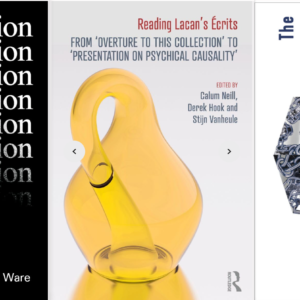News – April 2024
20% off and free global shipping on all Routledge titles for LacanOnline.com readers. Use this link and code S031 at the checkout.
Starting with new book releases, The Unconscious in Neuroscience and Psychoanalysis: On Lacan and Freud by Marco Máximo Balzarini has just been published by Routledge. Presenting a model of the assimilation of the two disciplines, Balzarini also provides an overview of how Freud’s theory of the unconscious has been integrated into the work of recent neuropsychoanalysts and neuroscience researchers such as Mark Solms, Francois Ansermet and Pierre Magistretti. He argues that Lacan’s work can offer a new way of developing the dialogue between these two fields. Balzarini is Professor of Psychoanalysis at the Universidad Nacional de Córdoba, Argentina.
Adrian Johnston’s Infinite Greed: The Inhuman Selfishness of Capital has just been published by Columbia University Press. In this latest work Johnston’s thesis is that selfishness is not essential to capitalism. By bringing together a Marxist and Lacanian reading of political and libidinal economies, he endeavours to show how the infinite greed of capitalism itself “demands that individuals sacrifice their pleasures, their well-being, and even themselves to serve inhuman capital.” Thus instead of being responsive to people’s selfish interests capitalism instead overrides them.
Philosophy After Lacan: Politics, Science, and Art edited by Alireza Taheri, Chris Vanderwees, and Reza Naderi will be published by Routledge on 18th May. Instead of concentrating on theorists who came before Lacan, this collection brings to together reflections on contemporary philosophy inspired by and in dialogue with Lacanian theory. Contributors alongside the editors include Slavoj Zizek, Sergio Benvenuto, and Jamieson Webster.
Turning to upcoming events, on 29th May the Freud Museum London presents an in-house talk and Q&A with psychoanalysts Christian Dunker and Ian Parker on ‘Psychoanalysis as Science’. The speakers will present their distinct perspectives on this long-contented question of the status of psychoanalysis. Parker’s books include Radical Psychoanalysis and Anti-Capitalist Action and his insightful and often amusing memoir of his path to becoming an analyst, 2019’s Psychoanalysis, Clinic and Context: Subjectivity, History and Autobiography.
On 1st June the Guild of Psychotherapists will host Lacanian analyst Conor McCormack for a talk on ‘The Unconscious from Freud to Lacan.’ The Unconscious is the fundamental and foundational concept of psychoanalysis – but how are we to listen out for it today? Does it have meaning or utility for talking therapists beyond the imprecise metaphors often employed to describe it? This talk charts the genesis of the concept of the unconscious from Freud to Lacan – a theoretical leap that illuminates much of 20th century thought. The talk asks how a therapist/analyst negotiates the difficult melding of theory and practice that is the real of the clinic. What conceptual tools can help us to listen out for what is singular in someone’s speech, while resisting the defensive compulsion to impose our own understanding onto what is said?
On YouTube, Todd McGowan gives an excellent presentation on the concept of das Ding, in particular its appearance and then disappearance over the course of Lacan’s Seminar VII on The Ethics of Psychoanalysis. McGowan’s talk also presents a good summary of Lacan’s thinking on sublimation as an act in which an object is lifted out of the circulation of exchange objects to found the subject’s enjoyment. He comments on Lacan’s reading of Antigone, whose insistence on the burial of her brother Polynices is, McGowan argues, an act of sublimation that places her beyond the limits that govern the realm of the good, which McGowan opposes to the imperative of capitalism to reduce all objects to objects of exchange.
John Dall’Aglio’s seminar on ‘A Lacanian Neuropsychoanalytic Perspective on Dreams’, which was hosted by Lacan in Scotland back in January, is also now available on YouTube. Dall’Aglio provides an overview of the parallels between Lacanian register theory and computational and affective neuropsychoanalysis. Dream interpretation is discussed as one method for discerning the non-declarative patterns (abstract rules and action plans) that the subject relies upon to manage conflicting affective demands. Clinically, he shows how identifying such elements can provoke a potential space to loosen how these patterns might play out in everyday life.
More treasures on Richard G. Klein’s Freud2Lacan.com this month. Two side-by-side translations of Lacan’s Écrits paper Propos sur la causalité psychique [Presentation on Psychical Causality], are at number 42 on the link above. Another paper from the Écrits, on Ernest Jones’ theory of symbolism, is available in bilingual translation at number 68 on the page. An alternative translation of the Proposition of 9th October 1967 is under the list of Autre Écrits at number 149. There are also transcripts of Lacan’s consultations with psychiatric patients which took place in the mid- to late-1970s. The Présentation de Mlle Boyer and the Présentation de Mme Solado are the two most recently updated in the last month with the psychiatric reports for both patients – which Lacan would have read prior to seeing them – accompanying the transcripts of Lacan’s sessions themselves. See 108-110 on the list on the page linked to above.
Finally, from the Sydney Lacan Study and Reading Network comes two recent texts from their seminars at the start of the year. The first, from January, is on Models in Lacan’s Stylistics, and explores the difficulties and obscurities in Lacan’s texts that make them appear impenetrable. The second, from February, is on The Poetics of Feminine Desire in Duras’s The Lover. Both are authored by Dr Ehsan Azari Stanizai.
Got news? Get in touch.




Leave a Reply